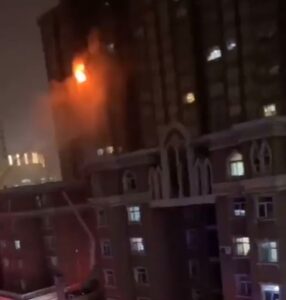
(An Account of the Urumqi Fire Tragedy that Occurred on November 24 Last Year)
It has been a year since the devastating events of the Urumqi fire tragedy on November 24. While the world may have moved on, the gravity of that day lingers vividly in our memories. On that fateful day, the Uyghur community witnessed a tragedy unparalleled in the annals of human history, as 44 lives were lost in a fire that engulfed a building inhabited by Uighurs in Urumqi.
Tragically, the majority of those who perished were mothers and children. The desperate cries of mothers and children echoed through the burning buildings, reaching across Urumqi and resonating worldwide through the internet. Regrettably, no assistance could be extended, for China was in the throes of a plan to reduce the virus to zero, resulting in locked doors and impassable barriers. Compounding the tragedy, some of those trapped in the fire had family members in prisons and camps, rendering them physically unable to escape.
Neighboring buildings and Al-Jamaat heard the anguished cries of souls trapped in the inferno, yet they too were under siege and unable to intervene. Chinese fire engines faced obstacles reaching the building promptly due to natural and man-made impediments, such as roped perimeters and wooden barriers. Surprisingly, China’s military and police forces, known for their bravery in “terror” incidents, did not exhibit the same courage in rescuing the helpless victims.
Chinese media reported that the fire brigade, despite taking three hours to extinguish the flames, claimed success in their mission while withholding the identities and true number of those who perished. As of now, we only know the names of Qambarnisa (48) and her three children Shahida (13), Abdurrahman (9), and Nahdia (5). Uyghur activists continue to seek answers to crucial questions: Were the bodies buried in accordance with local religious and national customs? Were the families of the deceased in prisons and camps informed and included in the death ceremony? Did the families receive compensation or assistance?
On November 24, 44 lives were lost, enduring hours of burning and suffocation. Mothers clutched their babies, and patients sought refuge within the confined corners of rooms. While the world may have relegated this scene to the past, we, as a society, will never forget. These victims were a vulnerable segment of our community, casualties of the profound childhood disaster within the camps. We have yet to demand accountability from China, trusting that history will one day unveil the truth.
Let us not overlook that, during these harrowing days, the Turkish government extended apologies to our people through a press release, and the European Union urged China to provide a transparent account of the tragedy and hold those responsible accountable. Sadly, no responses were forthcoming from the accused.
On this somber day of remembrance, we lay bare the truth before the global community: entrusting the investigation of a crime to the perpetrator only perpetuates animosity, not the illumination of justice. The Urumqi fire tragedy on November 24 stands as a poignant stage and mirror reflecting the broader Uyghur massacre. We implore every individual and institution that identifies with the values of humanity to remember this stage and heed the lessons it imparts.
Rabia Kadeer
Leader of the Uyghur National Movement
Leave a Comment